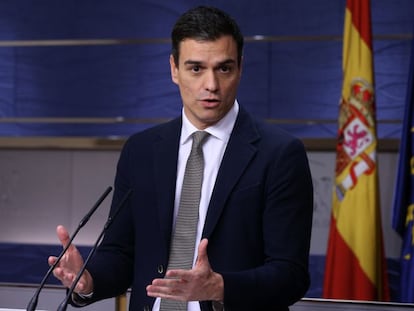Socialists seek deals with Podemos allies in bid to form government
The emerging anti-austerity party has ruled itself out of any agreement involving Ciudadanos


The Spanish Socialist Party (PSOE), which is seeking deals to form a government after more than a month of political gridlock, is going to try to bring together parties with differing views by offering common policies of reform.
The inconclusive election of December 20 has forced parties into an unprecedented series of talks to build enough support for a governing coalition – or failing that, at least to get a candidate appointed prime minister and placed at the helm of a minority government.
Sánchez has already started negotiating a potential governing program with emerging party center-right party Ciudadanos
After weeks of preliminary talks, formal negotiations are getting underway on Monday. Sources at PSOE headquarters in Madrid said “it all begins today.”
The Socialists came in second at the election but are trying to form an alternative coalition after the winning Popular Party (PP) conservatives failed to present a nominee to the prime minister’s office.
But Socialist leader Pedro Sánchez’s attempts to build a broad consensus are doing as much to highlight differences as to underscore similarities.
Sánchez has already started negotiating a potential governing program with emerging center-right party Ciudadanos, whose leader he met last week.
On Monday, Socialist representatives were scheduled to meet with Ciudadanos again, then with United Left and with Compromís, a leftist group from Valencia.
However, Sánchez has been unable to make any headway with Podemos, the other major emerging party, because its leader Pablo Iglesias refuses to enter any alliance that includes Ciudadanos.
On Monday, Socialist representatives were scheduled to meet with Ciudadanos again, then with United Left and with Compromís, a leftist group from Valencia
Rather, Iglesias has suggested a three-way governing coalition between the Socialists, Podemos and the United Left. In this scenario, Iglesias would seek the position of deputy prime minister.
Socialist sources said that the renewed talks that begin this week may force the anti-austerity party into explaining why it alone refuses to participate in a program of consensus, while other leftist forces are doing so.
“Aren’t they left-wing and progressive?” wondered one source.
Pedro Sánchez, who obtained 90 seats at the election, cannot hope to be voted in prime minister at the upcoming investiture vote – most likely to be held in late February or early March – without support from Ciudadanos (40) or Podemos (69, although four deputies have since broken away). This support could take the form of a yes vote or at the very least of an abstention.
Acting Prime Minister Mariano Rajoy has been unable to muster enough backing to ensure his own reinstatement and has adopted a wait-and-see strategy
Podemos and Ciudadanos were the two revelation parties of the latest election. Their strong performance, based on messages of profound change for Spain, attracted disenchanted voters and broke the two-party hegemony long enjoyed by the PP and the PSOE.
Although the PP formally won the election with 123 seats, this is not enough for the congressional majority of 176, and acting Prime Minister Mariano Rajoy has been unable to muster enough backing to ensure his own reinstatement. He has since adopted a wait-and-see strategy in the hopes that Sánchez will fail to cobble together an alternative alliance and be forced to consider a grand coalition of PP and PSOE.
English version by Susana Urra.
Tu suscripción se está usando en otro dispositivo
¿Quieres añadir otro usuario a tu suscripción?
Si continúas leyendo en este dispositivo, no se podrá leer en el otro.
FlechaTu suscripción se está usando en otro dispositivo y solo puedes acceder a EL PAÍS desde un dispositivo a la vez.
Si quieres compartir tu cuenta, cambia tu suscripción a la modalidad Premium, así podrás añadir otro usuario. Cada uno accederá con su propia cuenta de email, lo que os permitirá personalizar vuestra experiencia en EL PAÍS.
En el caso de no saber quién está usando tu cuenta, te recomendamos cambiar tu contraseña aquí.
Si decides continuar compartiendo tu cuenta, este mensaje se mostrará en tu dispositivo y en el de la otra persona que está usando tu cuenta de forma indefinida, afectando a tu experiencia de lectura. Puedes consultar aquí los términos y condiciones de la suscripción digital.










































